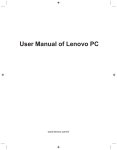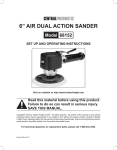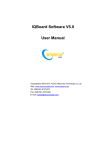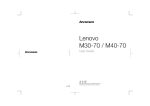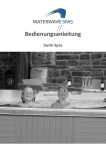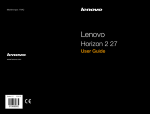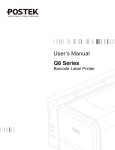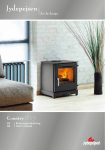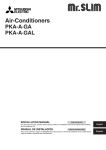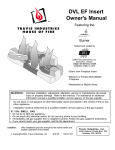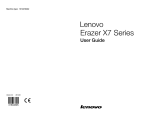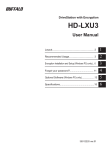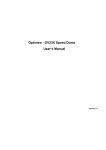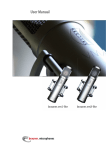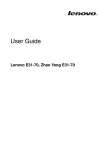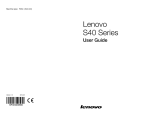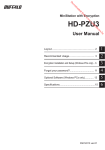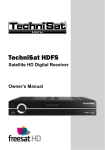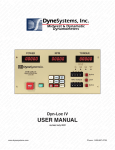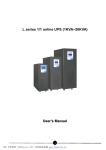Download User Manual of Lenovo PC - ps-2.kev009.com, an archive of old
Transcript
User Manual of Lenovo PC www.lenovo.com/in 2 家悦 K 系列用户手册 Declaration Lenovo is a trademark of Lenovo international. Microsoft is the registered trademark of Microsoft. Microsoft WindowsXP is the WindowsXPregistered trademark of Microsoft Corporation. Intel is the registered trademark of Intel. AMD, the AMD logo, AMD Athlon and AMD Opteron are trademarks or registered trademarks of Advanced Micro Devices, Inc. Please find above the notes on trademarks or registered trademarks of Lenovo and its partners. Other registered trademarks mentioned in this manual belong to the corresponding corporations, respectively. This manual is under the protection of the Copyright Law. All rights are reserved, and any reprint is subject to legal penalty. No part of this manual can be photocopied, reproduced or translated into other languages without prior consent of Lenovo international. The names or logos of some corporations mentioned in this manual are only for purposes of announcement of trademark rights. It does not necessarily mean that the product contains the relevant software or hardware. Please refer to the description on the packing list for detailed configuration of the product. 家悦 K 系列用户手册 3 Explanation of Symbols Danger: Caution, extremely dangerous Warning: Caution, moderately dangerous Note: Caution, minimal danger Recommendation: Helpful instructions Forbidden: Dangerous operation Table of Contents Declaration Statement Explanation of Symbols Chapter 1 Computer Hardware Connections ................................... 1 1.1 Front View of the Chassis .............................................................. 2 1.2 Rear view of the Chassis ............................................................... 4 1.2.1 Audio configuration (only with Windows XP) ................................. 6 1.3 Connecting speaker ..................................................................... 10 1.4 Helpful tips on the installation ...................................................... 10 1.5 Connecting and using the flying shuttle box ................................ 11 1.5.1 Used with internet chat talking device ......................................... 11 1.5.2 Using the USB connectors, headphone, microphone connectors on the flying shuttle box ............................................................... 12 1.5.3 Using the flying shuttle box .......................................................... 12 1.6 Keyboard ...................................................................................... 15 1.7 Using Quiet Mode ........................................................................ 15 1.8 Connecting CCD Camera ............................................................ 16 1.9 The remote control ....................................................................... 17 Chapter 2 System Installation .......................................................... 21 2.1 Driver and Application Auto-installation ....................................... 22 2.2 Using the OneKey Recovery function .......................................... 25 Chapter 3 The introduction on usage of software ......................... 33 3.1 Digital Media Plateform ................................................................ 34 3.1.1 TV ................................................................................................. 34 Table of Contents 1 3.1.2 Update Media Library ................................................................... 39 3.1.3 Video ............................................................................................ 40 3.1.4 Pictures ......................................................................................... 44 3.1.5 Music ............................................................................................ 47 3.1.6 System settings ............................................................................ 49 3.2 Burning CD ................................................................................... 51 3.3 Norton ........................................................................................... 61 Chapter 4 Safety In Use .................................................................... 69 4.1 System Restore ............................................................................ 70 4.2 Disk Cleanup ................................................................................ 73 4.3 Hard disk error checking and repairing ........................................ 74 4.4 Disk Defragment .......................................................................... 75 4.5 Daily Care ..................................................................................... 76 Chapter 5 Troubleshooting .............................................................. 77 5.1 Display .......................................................................................... 78 5.2 Sound ........................................................................................... 78 5.3 Desktop Icons ............................................................................... 80 5.4 Software Problems ....................................................................... 82 5.4.1 End Programs .............................................................................. 82 5.4.2 Add or remove programs ............................................................. 82 5.5 CD-ROM Drive and hard disk drive ............................................. 83 5.6 Special Notes on Models ............................................................. 84 Appendix 2 Table of Contents 1 Chapter 1 Computer Hardware Connections Note: Please carefully read through this chapter. It contains information on the various external connectors on your computer, connecting components, and helpful tips. 1 2 This chapter provides the following information: Hardware configuration of the computer Helpful tips on components connection and usage 3 Note: Not all models have all these features, Please refer to your system. 4 5 Lenovo 3000 Q Series User Manual 1 1.1 Front View of the Chassis Button and function key usage on the front panel of the chassis. Hard disk drive indicator OneKey Recovery Reset Quiet mode Power button Digital mode Front digital baffleplate Power button: By pressing this key, you can start up or shut down the computer. Reset: By pressing this key, you shall force the computer to restart. Please use caution when using this key. All unsaved data will be lost. OneKey Recovery: For models that have the OneKey Recovery function, pressing this key, while the system power is off will start OneKey Recovery. Quiet mode: Pressing this key, while in Windows, will reduce the computer’s noise. Hard disk drive indicator: This indicates the read/write operations of the hard disk. Digital mode: Pressing this key, will enable the Digital Media platform function. Front digital baffleplate: Behind the front digital baffleplate, you will see the front digital connectors , as shown in the figure below: 2 Lenovo 3000 Q Series User Manual Optical drives MS/Pro/Duo MMC/SD USB connectors Speaker/headphone connector SM 1394 connector Media card reader CF/MD Microphone connector USB connectors: Used to connect USB devices. Speaker/headphone connector: Used to connect speakers or headphones, Microphone connector: Used to connect a microphone. Media card reader: Used to read storage cards of MS,MS PRO,MS Duo,SD,MMC,SM,CF and MD etc. (Some models are not equipped with memory card reader) 1394 connector: Used to connect 1394 devices. (Some models are not equipped with this connector) Lenovo 3000 Q Series User Manual 3 1.2 Rear view of the Chassis IO connector usage on the rear panel of the chassis The rear panel connectors are shown in the figure below. Some models are not equipped with all the connectors. Please refer to your system, Standard mouse connector Parallel connector Standard keyboard connector Serial connector VGA monitor connector LCD power connector power connector Ethernet connector USB connectors Audio line in connector Microphone connector Speaker/headphones connector External Graphics Card Connector Telephone Modem TV antenna connector 4 Lenovo 3000 Q Series User Manual Standard mouse connector Parallel connector Standard keyboard connector Serial connector VGA monitor connector LCD power connector power connector Ethernet connector USB connectors 7.1 Audio connector External Graphics Card Connector Telephone Modem TV antenna connector power connector: Used to supply power to the computer. LCD power connector: Used to supply power to the LCD monitor that is supplied with the computer. Standard mouse connector: Used to connect a mouse with a PS/2 type of connector. Standard keyboard connector: Used to connect a keyboard with a PS/2 type of connector. Serial connector: Used to connect serial devices. (COM port) Parallel connector: Used to connect parallel devices. (LPT port) VGA monitor connector: Used to connect the signal cable of the monitor.(VGA) (Some models have this connector, some models have a External display card connector. See below.) USB connectors: Used to connect USB devices. Ethernet connector: Used to connect to LAN or wide band web devices. External Graphics Card Connector: Used to connect the signal cable of the monitor.(VGA) (Some models have this connector, some models have a VGA display connector. See above.) If the External display card has a S-video connector, it can be used to connect to a television to display the computer screen. TV antenna connector: Used to connect to a TV antenna. (some models equipped with TV cards have this connector) Modem: Used to attach your computer to a telephone line for modem use.(some models equipped with this connector) Telephone: Used to attach a telephone line to your computer for modem use. (some models equipped with this connector) 7.1 Audio connector: See the following section Audio Configuration for 7.1 use. Lenovo 3000 Q Series User Manual 5 1.2.1 Audio configuration (only with Windows XP) 7.1 Audio connectors: audio input, microphone, line out, rear speaker output, central/ heavy bass output, side speaker output. 7.1 Audio connectors To set up audio: Step 1 Right click the audio configuration icon on the bottom-right corner of the screen. Step 2 Select “Sound Manager” on the audio configuration menu as shown in the figure. 6 Lenovo 3000 Q Series User Manual Step 3 Open the interface as shown in the figure. The sound effects and mixed audio demonstrations etc. of the sound card can be configured in this interface. Open “Audio I/O” and you can configure the input and output of the sound card. Step 4 The audio connectors shown in the figure match the I/O connectors on the rear panel. Configuration for the factory configuration of 2.0 speakers: Step 1 Select 2CH speaker as shown in the figure. And then connect the audio input cable of the speaker to the black connector. Lenovo 3000 Q Series User Manual 7 Step 2 Select “Line out” on the dialog box, as shown in the figure. When connecting other audio devices, plug the audio cables into the respective I/O connectors on the rear panel. Once a connector is connected a dialog box will pop up , as shown the figure. Select the device name according to the type device connected. You can test if the connections and configurations are correct by clicking the sound box icons in the corresponding location in the left figure. 8 Lenovo 3000 Q Series User Manual Note: When connecting a device, one thing should be paid attention—be sure to plug microphone into the place as shown in the figure. If you don’t plug a microphone into the microphone connector and select “Microphone” in the popped up window as shown in the figure. An error prompt shall come up as shown in the figure. Plugging a microphone into the front microphone connector shall not cause the prompt dialog box to come up. Lenovo 3000 Q Series User Manual 9 1.3 Connecting speaker Volume adjustment Bourdon effection Connect to Speaker/Headphone Power switch the connection of main and sub speaker power cord 1.4 Helpful tips on the installation Line in cable Monitor signal cable Monitor power cord 10 Lenovo 3000 Q Series User Manual Please Note: 1. To avoid electromagnetic disturbance in the monitor don’t place the speakers too close to the monitor. 2. Please tighten the screws on the monitor signal cable. 3. If the model you bought is not equipped with the independent display card, please connect the monitor cable to the connector of the VGA display connector. 1.5 Connecting and using the flying shuttle box 1.5.1 Used with internet chat talking device The built-in speaker and microphone on the monitor base enable you to directly communicate with others by voice when using internet chat software. Please Note: 1. Please use the USB cable, that is packaged with the monitor, to connect the flying shuttle box to the computer as shown in the following figure. 2. You must use the power adapter and power cord , that is packaged with the monitor to connect them to the power supply as shown in the following figure. 3. Use the switch on the back of the flying shuttle box to power it on. The monitor adjustment Built-in Speaker Flying shuttle box The monitor power switch Adapter Connect to the USB of the computer Lenovo 3000 Q Series User Manual 11 Flying shuttle box switch Headphone, Microphone connector USB HUB Build in microphone Note: To ensure proper operation please ensure that the LCD monitor and the flying shuttle box are properly plugged to the power and the flying shuttle box switch is turned on. 1.5.2 Using the USB connectors, headphone, microphone connectors on the flying shuttle box 1. Connect to the USB connector on the rear panel connector of the computer with USB cable. 2. Connect the power adapter and plug the switch to the power on. 3. The USB connectors on the flying shuttle box have limited power. Please do not use high power USB devices like USB hard disks in all the ports at the same time. 1.5.3 Using the flying shuttle box Models configured with LCD monitors have a flying shuttle box beneath the monitor that can used to start Windows programs. After the system has booted and the Lenovo Navigator program has started this function is available. 12 Lenovo 3000 Q Series User Manual Built-in Speaker Rotary case Menu button Built-in microphone Usage of the flying shuttle box: The Lenovo Navigator program runs only on Windows XP. The middle key: Open/ close Lenovo Navigator program. When the Digital Media Platform has started, the middle key is used as the Return key. When the Digital Media Platform has not started, holding down the middle key for 5 seconds will cause the system to go into the standby. Pressing any key on the shuttle will wake up the system. Turning the rotary case: turning the shuttle selects the Digital Media Platform functions. Pressing down the rotary case: Enters into the selected item of the Digital Media Platform Function. After starting up the Digital Media Platform: Turning the rotary case: moves the option focus. Pressing down the rotary case: confirms the option. When playing photograph, music and video files: Turning the rotary case: switches the playing files. When watching TV it switches the channels. Pressing down the rotary case: Starts or pauses the video, photograph or music files. Built-in Speaker: If start up a internet chat software, conversations are heard through the built-in speaker. Built-in Microphone: If start up a internet chat software, your voice is sent out through the built-in microphone. Lenovo 3000 Q Series User Manual 13 The usage is as follows: flying shuttle box After the shuttle drivers has been installed, pressing the middle key of the shuttle will start the Lenovo Navigator program. The Lenovo Navigator runs only on Windows XP. flying shuttle box After starting up,and as shown in the figure, the program dial shall come up on the lower side of the screen, Turning the shuttle shall cause each software icon to rotate into focus. When the desired software icon is in focus, pressing “rotary case” once shall start software. flying shuttle box Turning the rotary case will make the yellow option bar move between each of the choices in the menu. When the desired menu item is highlighted pressing the rotary case once will activate the function. flying shuttle box Turning the rotary case will make the yellow option bar move between each of the choices in the menu. When the desired menu item is highlighted pressing the rotary case once will jump to the folder that contains the files. Turn the rotary case again and the focus moves between files. Press down the rotary case and the selected file shall be played. 14 Lenovo 3000 Q Series User Manual 1.6 Keyboard 1.7 Using Quiet Mode Quiet Mode causes the CPU and fans to slow down, which reduces the noise you will hear from the machine. It is suitable for use during word processing, web surfing and other activities that do not require high CPU resources. Activities like Gaming require high CPU resources and are not suitable for Quiet Mode operation. After the system boots Windows XP, pressing the “Quiet mode” key on the front panel will cause the system to enter “Quiet Mode”, and the Quiet mode indicator light will turn blue. Press the Quiet Mode key again to exit the Quiet mode. Attentions for Quiet mode: In “Control Panel” → “Power Options” → “Power Schemes”, select “Lenovo Power Management”. After selecting this option, do not change again, otherwise you shall not be able to enter the Quiet mode. Where the “Turn off monitor” “Turn off hard disk” and “System Standby” etc. can be changed by users. Lenovo 3000 Q Series User Manual 15 The conditions for the system to enter the Quiet mode: 1. If you use software that needs high CPU resources for a long time, or use a third-party software to adjust CPU frequency, the system shall automatically return from the Quiet mode to the normal mode. 2. If you start the “Quiet mode” in Windows XP, please be sure to exit the “Quiet mode” before shutting down the computer. 1.8 Connecting CCD Camera For models that are equipped with cameras, we suggest you connect CCD camera to the USB connector on the computer with a USB cable, as shown in the following figure. For the detailed instructions, please see the manual that comes with the camera. 16 Lenovo 3000 Q Series User Manual 1.9 The remote control The remote control should be associated with the remote control receiver on the chassis,Please adjust the degree to get the best wireless connection. Windows mode Windows startup key Digital Media Platform Digital Media Platform startup key Video Music Picture TV Four entertainment function switch key. Press anykey, can enter into the relevant function Number TV channel number key and number input key Jump The channel recall /reread Mark: check mark Invalid Key DVD Menu Switch to DVD Main Menu Invalid Key Direction Key: Move the focus Circumrotate center key: Roll the menu option Press center key:confirm the option Return Return to previous menu Menu: display the OSD Menu Mute Volume adjust Play Control Snap shot Play/Pause Fast Backward/Fast Forward Prev Chapter/Next Chapter Stop Open/Close optical drive Switch channel/Switch play speed Volume Balance: Switch to left, right and double track Press once, Switch to one mode Record the program Lenovo 3000 Q Series User Manual 17 Remote control usage Note: To use the remote control, point it at the remote sensor on the PC please! Use the remote control at a maximum distance of 10m from the remote sensor and at a maximum of 30degrees off center of the remote sensor. Note: the remote control effect is affected by the chassis position, entironment (including the temperature, sunlight and etc.) and the battery volume . Remote control usage — Direction key In the Digital Media Platform, the focus will move along with the dial turning. Press Up or Down direction key, the focus will move up or down. Press Left or Right direction key, the focus will move to the left or right. 18 Lenovo 3000 Q Series User Manual Remote control usage — Menu key In the Digital Media Platform, press the Menu key, the setup menu will appear. We can set the playing parameter in the menu. Remote control usage — Menu key Press Up or Down direction key, you can select which option to be adjusted. After confirming the option, press Right direction key, to choose parameters. Press Up or Down direction key, you can select which parameter to be adjusted. Press Left or Right direction key to adjust the parameter value. Remote control usage — Return key If you want quit function, press the Return key. Lenovo 3000 Q Series User Manual 19 20 Lenovo 3000 Q Series User Manual 2 Chapter 2 System Installation 1 This chapter provides the following: 1. Driver and Application Auto-installation 2. OneKey Recovery By using the OneKey Recovery function, it will restore your C partition back to the 2 orginal factory default or to the most recent backup saved. All data in the C partition will then be erased. Other partitions in the hard disk will not change. Note: Your C partition must use the FAT32 partition 3 format to successfully use the OneKey Recovery function. 4 5 Lenovo 3000 Q Series User Manual 21 2.1 Driver and Application Auto-installation After finishing system installation,press the OneKey Recovery key on the chassis, in the off status. Then select “Driver and Application Auto-installation”. The driver and application will be installed automatically. Please operate according to the software prompt. Automatically installation After finishing system installation, press the OneKey Recovery key on the chassis, in the off status. Then select “Driver and Application Auto-installation”. Click “Install(Y)” or press “Y” key on the keyboard. Click “Continue(Y)” or press “Y” key on the keyboard. 22 Lenovo 3000 Q Series User Manual The computer restart. After restarting, the “Driver and Application Auto-installation” software will be installed automatically. Then the software will prompt as show in the figure. Click “Yes”, begin the auto-installation. Click “No”, begin the selective installation. The driver and application will be installed automatically. The auto-installation finished, the prompt as show in the figure pop up.Click “Exit” to complete auto-installation. Lenovo 3000 Q Series User Manual 23 Selective installation When the “Driver and Application Autoinstallation” software is installed completely. Click “No”, begin the selective installation. Selective installation You can select driver or software installation respectively. Click “Driver auto_installation” to install drivers. Click “Bundled software installation” to install bundled software. Selective installation- Driver auto_installation Select “Automatic Installation” to install all the drivers automatically. Select “Optional Installation” to install the drivers you need. Wait for the installation. 24 Lenovo 3000 Q Series User Manual Selective installation- Bundled software installation Select “Auto_Installation” to install all the software automatically. Select “Copy to” to copy the software to the harddisk.Then begin to install. 2.2 Using the OneKey Recovery function System Recovery Press “Recovery” button on the keyboard when the startup screen displays. Press key ( R ) and ( r ) to select “System Recovery”, and press key “Enter” to confirm. Lenovo 3000 Q Series User Manual 25 System Recovery Follow the instructions on the screen. Press E to confirm the recovery. Note: Please make sure to backup all your data before performing a system recovery. If this is not done, all data in the C partition will be lost. System Recovery The recovery process will take a few minutes, so please be patient. You do not want to interrupt the operation. System Recovery After the recovery is completed, you will be prompted to restart your computer. 26 Lenovo 3000 Q Series User Manual System Backup To perform a system back press key ( R ) and ( r ) to select “System Backup”, and press key “Enter” to confirm. This software enables you to backup the current data in the C partition. Note: 1. When you backup the data in the C partition, the default backup in the hidden partition, or the last saved backup, will be overwritten. 2. Do not change the size or location of the C partition after you make the backup. Otherwise, the backup data will not be able to be successfully restored. System Backup Press E to confirm the backup and to continue. System Backup System backup operation may automatically use the un-allocated disk space from the end of the disk if needed. Press E to confirm the backup and to continue. Lenovo 3000 Q Series User Manual 27 System Backup Follow the instructions on the screen. Press E to confirm the backup. System Backup The backup process will take a few minutes, so please be patient. You do not want to interrupt the operation. System Backup After the backup is completed, you will be prompted to restart your computer. 28 Lenovo 3000 Q Series User Manual System Backup If the System Backup prompt is as shown: There is not enough space for backup! You need to adjust your harddisk space to release enough unallocated space at the end of harddisk. Note: The unallocated space should exceed the required total space in size. Space Release Enter “Computer Management” in the “Control Panel”. Delete partition at the end of the harddisk to get enough space. Note: Please make sure to backup all your data before performing space release. If this is not done, all data in the released space will be lost. System Backup Then startup “System Backup” to backup the current data in the C partition. Lenovo 3000 Q Series User Manual 29 New Partition • After system backup, Right Click on My Computer Click on Manage • Now click on Disk management in the list, Right click on Unallocated Space • Click on New Partition New Partition Select “Extended partition”. Then click “Next”. New Partition Fill in the Partition size in MB. 30 Lenovo 3000 Q Series User Manual New Partition Click “Finish” to complete the new partition establishment. Backup Uninstallation If you do not need the backup data any more, you can uninstall the backup to free up the space on the hard disk. Press key ( R ) and ( r ) to select “Backup Uninstallation”, and press key “Enter” to confirm. Lenovo 3000 Q Series User Manual 31 Backup Uninstallation Press E to confirm the uninstall backup. Note: Some space will become free space being released and cannot be consolidated in the last partition. Backup Uninstallation After the uninstallation is completed, you will be prompted to restart your computer. Help Press key ( R ) and ( r ) to select “Help”,and press key “Enter” to confirm. You can get helpful tips about how to use the OneKey Recovery function. 32 Lenovo 3000 Q Series User Manual 3 Chapter 3 The introduction on usage of software 1 This chapter provides the following: The methods of using Digital Media Platform. Include: TV function, playing video, enjoying pictures, playing DVD etc. The method of burning optical discs. The usage of anti-virus software. 2 Note: 1. All the software interfaces follow the software provided with the computer you purchased. 2. The TV function described in this chapter is only applicable to the computers equipped with TV cards. 3. The burning function described in this chapter is only applicable to the computers equipped with the rewritable optical drives. 4. If you have any question about Norton AntiVirus,please refer to the following access for help: India: 1600 221 133 http://www.symantec.com/region/reg_ap/techsupp/consumer.html 5. If you have any question about RecordNow, please refer to the following access for help: Tel: 1-905-482-3000 WebMail: http://support.sonic.com/soniconline/ Hours: Monday - Friday, 9am to 7pm EST 3 4 5 6. If you have any question about Digital Media Platform,please refer to the following access for help: http://www.intervideo.com Lenovo 3000 Q Series User Manual 33 3.1 Digital Media Plateform In Digital Media Platform, the Digital Media Platform function enables you to enjoy abundant home entertainment such as watching TV, playing videos, enjoying pictures and playing music. In addition the Direct Burn function enables you to directly burn the contents to a CD, VCD, DVD, data disc. when you are playing music, browsing pictures or playing videos. Digital Media Platform functions include: TV, Video, Pictures and Music. 3.1.1 TV When cable TV input is connected successfully, you can watch TV shows on your computer. Note: The first time you enable TV function, you must run “Channel Scan” for the TV channels. After channel scaning, the TV programs shall be automatically be arranged according to the order of the local TV channels. Start Press down the middle key of the flying shuttle box to start the Lenovo Navigator program. Turn and select a Digital Media Platform, start the Digital Media Platform. Select “TV”, switch the channels. Switch channel Click the button on the bottom tool bar as shown in the figure, to switch channels to the previous one or the next one. 34 Lenovo 3000 Q Series User Manual Channel Surfing The TV function enables the computer to display the contents of 9 channels at one time. Click the “OSD Menu” button on the tool bar, select “Channel Surfing” in the channel setting option. You may set up multiple groups of 9 channels. During Channel Surfing, the TV function muted. Channel Surfing Click the PageUp or PageDown key, as shown in the figure, to preview the channels in other groups. Double click the selected channel, it will be displayed in full screen mode. Schedule Here you can set the schedule to record TV programs. Click the “OSD Menu” button on the tool bar, select “Schedule” to set the schedule for recording. Lenovo 3000 Q Series User Manual 35 Record Settings Here you can set the quality and file size of the TV Program to be recorded. Click the “OSD Menu” button on the tool bar, select “Recording Settings” to set recording attributes. Display Settings You can adjust the picture (brightness, contrast etc.) manually. Click the “OSD Menu” button on the tool bar, select “Display Settings” to adjust the screen settings. Signal Here you can adjust the signal source content of videos. Click the “OSD Menu” button on the tool bar, select “Signal” in the Setting menu to adjust the TV Audio and signal source. 36 Lenovo 3000 Q Series User Manual If you need to search for TV channel again, you can perform “Channel Scan” in the Channel option of the Settings menu. Volume down Record Stop Play/Pause Channel Down Volume up Mute Channel recall Channel Up OSD Menu Snapshot By clicking the Play/Pause button in the TV module you will be record TV to your hard disk to be viewed later. Clicking the Play button will allow the TV Program to resume from where you left. Clicking the Fast Forward key will allow you to catch up with the normal progress of the TV show. Audio setting If you hear abnormal audio output,we suggest you confirm your audio config as following: Double click the audio icon in the notification area. Select “Options” → “Properties” in the pop-up “Master Volume” menu. Lenovo 3000 Q Series User Manual 37 Select “Realtek HD Audio input” in “Mixer device” menu. Then check “Stereo Mix”, click “OK”. Check “Mute” in “Stereo Mix” menu . 38 Lenovo 3000 Q Series User Manual 3.1.2 Update Media Library If you want to enjoy pictures, music and videos in the Digital Media Platform, you must first add the pictures, music and videos to the Media Library, as follows: Step 1 In the main interface of Digital Media Platform, select “Setting”. Step 2 Select “Update”. Step 3 Select the hard disk and folder that store the media files. Lenovo 3000 Q Series User Manual 39 Step 4 Check the folder that stores the media file. Step 5 Click “Update”. 3.1.3 Video Play the video movies or Video CDs stored in the computer. Start In the Digital Media Platform, select “Video” or use shuttle to select “Video” to start. 40 Lenovo 3000 Q Series User Manual All Videos Lists all the videos stored on the hard disk and CD ROM. To select the movie to play, click on the Play button. Play all the videos If you want to play all the videos, check “All Videos”. Click on the Play button, then all the videos shall be played in order. My Favorites: click the checkbox for the videos that you would like to add to my favorites, and then select “Add to Favorites”. Most Played: arrange the videos according to the number of times it has been played. Other Media: display the videos stored in the external storage devices of the computer. Burning: Burn the selected videos into CDs. Sort Videos can be indexed by the order of their names, created time, formats or the most recent date they were played. Lenovo 3000 Q Series User Manual 41 Burning Videos can be burnt to Video CD,Data Disc,DVD Video. Select the video file and click “Burning”. Burning You can set the burning parameter. Then click “Next”. Burning Insert Recordable Media, then begin to burn. When burning is finished, take out the CD. 42 Lenovo 3000 Q Series User Manual Settings Fast Backward Stop Play/Pause Fast Next Chapter Fast Forward Slow Volume Up Volume Down Jump OSD Menu DVD Menu Mute Prev Chapter Snapshot Audio Channel Slow/play: Play slowly/ fast, when playing fast: the playing speed can be switched to be 1, 1.5 or 2 times normal speed. When playing slowly: the playing speed can be switched to be 1, 0.8, 0.7 or 0.5 times normal speed. Jump: Click on the Jump menu, input the amount of time to skip and the program shall jump forward that amount of time. OSD Menu: Adjust the menu appearance when playing movies. Click “OSD Menu” button, the following menu shall come up. Display The display menu is used to adjust the brightness, saturation and contrast of the screen when playing videos. Audio Adjust the sound effect when playing movies. Lenovo 3000 Q Series User Manual 43 Settings Adjust the size of the window when play movies, and toggles the OSD Display on and off. DVD Settings Adjust the display of Subtitle, Audio, DVD Angle and Auto Resume when playing DVD movies. 3.1.4 Pictures Enjoy the pictures stored on the hard disk or other external computer storage devices. Start In the Digital Media Platform, select “Pictures” or use the shuttle to select “Pictures” to start. 44 Lenovo 3000 Q Series User Manual Play pictures List all the pictures stored on the hard disk and CD. select the pictures to be viewed then click on the Play button. View all the pictures If you want to play all the pictures, check “All Pictures”. Click on the Play button, then all the pictures shall be played in order. My Favorites: click the checkbox for the pictures that you would like to add to my favorites, and then select “Add to Favorites” . Other Media: display the pictures stored in the external storage devices of the computer. Burning: Burn the selected pictures into CDs. Sort The pictures can be indexed by their names, created time and format. Lenovo 3000 Q Series User Manual 45 Volume Down Play/Pause Stop Prev Chapter Next Chapter Volume Up Mute Zoom In Zoom Out Rotate Left Rotate Right OSD Menu Click “OSD Menu” button, you can adjust the options to view the pictures. Display Adjust the display attributes of pictures such as the duration and Transition when playing pictures. Settings Adjust the background music when playing pictures. 46 Lenovo 3000 Q Series User Manual 3.1.5 Music Enjoy the music stored on the hard disk or other external computer storage devices. Start In the Digital Media Platform, select “Music” or use the shuttle to select “Music” to start. Play Music List all the Music stored on hard disk and CD. Select the music to be listened to and click on the Play button. Enjoy all the music If you want to listen to all the music, then check “All Music” and click on the Play button. My Favorites: select a piece of music, and then select “Add to Favorites” to add the music into My Favorites. Top Music: arrange the music according to the number of times it has been played Other Media: display the music stored in the external storage devices of the computer Burning: Burn the selected music into CDs. Lenovo 3000 Q Series User Manual 47 Sort The music can be indexed by the name, Album, Genre, Artists, and most recently played. Play/Pause Stop Prev Chapter Slow Next Chapter Jump Fast Volume Down Eject Volume Up Mute OSD Menu Repeat Jump: Click on the Jump menu, input the amount of time to be skipped, and the music shall jump forward that amount of time. Repeat: Press the Repeat key once, click on the music you want to be played repeatedly, and press the Repeat key once again, the music shall be played over and over again. Press the Repeat key again, to cancel the replaying and return back to the normal playing. When you click on the “OSD Menu”, you can see the following adjusting options. Display The Display menu is used to adjust the background pattern when playing music. And adjust if the ID3 Display information is displayed. 48 Lenovo 3000 Q Series User Manual Settings Adjust the mode to play music. 3.1.6 System settings Setting In the main interface of Digital Media Platform, select “Settings”, here you can set the attibutes of the Digital Media Platform. Setting You can set “Auto Play”, “Transition Effects”, “System Sound”, and “Auto Shut-off”. Note: Country/District is used to select the International Broadcast TV standards that are corresponding to the Country/District the computer is being used in. For example: India uses PAL-B. The storage location of the video/sound files that Digital Media Platform uses is explained in “Storage location”. FAT32 partition format is recommended, because Digital Media Platform does not support NTFS partition format. Lenovo 3000 Q Series User Manual 49 Startup Digital Media Platform without entering Windows Press the Digital Media Platform on the front panel without turning on the PC. The Digital Media Platform will start up. Select option on the floating menu to enter relevant function. In the Digital Media Platform we can play music, film, picture and watch TV. The menu is hidden in the default situation. When you move the mouse pointer to the left of the screen, the menu appear. Note: In this condition, there is some difference from the Digital Media Platform in Windows: 1) “MyVideo” can not support the files format: .WMA, .WMV. 2) When you watch TV in this condition, please scan channel first. The channel scanning result in Windows system can not be used in this condition. 3) “My Video”, “My Music”, “My Picture” can not support the “Sort”, “My favorite” function. 4) “My TV” can only record and play the TV channel program. 5) The burning time is related to the file size. Normally Burning VCD (files size less than 600M) will take one and a half hour. Burning DVD (file size less than 4G) will take four or six hours. In this condition, you can burn DVD without entering the Windows. Select “Burning”, burn media files to the DVD. Select files, click “Burn”. 50 Lenovo 3000 Q Series User Manual Set up the recording parameter, and then click “Burn”, begin to burn the data. Note: the function can not other medium burning except VCD and DVD. 3.2 Burning CD RecordNow software can help you burn data, music and video files easily into CD or other data CDs. The detailed steps are as follows: Start Double-click on the software icon of RecordNow for Lenovo on the desktop. The Main Menu You can start CD burning through the Quick Start Links in the Main Menu. You can also rewrite and finalize the CD. Erase disc For a rewritable disc, you can erase the data on the disc. Click “Erase disc” to erase the disc. Lenovo 3000 Q Series User Manual 51 Erase disc Click “Yes” to start the disc erase process. Erase disc You can choose the “Quick Erase” or “Full Erase”. Erase disc Wait while the disc is being erased. When finished, the disc is ejected , and you can remove it for future use. Burning music CDs — Step 1 You can burn the music stored on the hard disk into Audio CDs by selecting “Audio CD for Car or home CD player”. Or, you can burn the music stored on the hard disk into MP3, WMA, WAV, or M4A format by selecting “Jukebox CD”. The software will prompt you to find the usable music files automatically, or allow you to find the files manually. Note: the following problems may cause the burning process to fail: • The file is being used by other applications. • Files recorded with non-standard sample frequency. (WAV and MP3 files must be recorded in 16 bit format with a sample rate of 22 or 44.1KHz. WMA files must use the sample rate of 44.1KHz and burned into 16-bit stereo files.) • WMA files have been copy protected (Windows license protection). • Audio files of Non-MP3/WMA/WAV formats. 52 Lenovo 3000 Q Series User Manual Burning music CDs — Step 2 Click “View”, open the music folder. Burning music CDs — Step 3 Select the music to be burned, Click “Add”, You can use the up arrow and down arrows to adjust the order of the music, when everything is ready, Click “Burn”. Lenovo 3000 Q Series User Manual 53 Burning data CDs — Step 1 In this option, you can select the data files on the hard disk and burn them into data file disc. Click “Data Disc”. Burning data CDs — Step 2 Open the data browsing dialog box, Click “Add Files and Folders”. 54 Lenovo 3000 Q Series User Manual Burning data CDs — Step 3 Open the dialog box to browse the hard disk files and select the files to be burned. Burning data CDs — Step 4 After selecting the files, Click “Burn”. Lenovo 3000 Q Series User Manual 55 Exact copy — Step 1 Here you can copy the disc. Click “Exact Copy”. Exact copy — Step 2 Place the source disc in the drive and Click “Copy”. 56 Lenovo 3000 Q Series User Manual Exact copy — Step 3 Wait while the read process finishes. Exact copy — Step 4 Remove the source disc and put a blank disc in the drive then, Click “OK”. Exact copy — Step 5 Wait while the disc burning is finished. Lenovo 3000 Q Series User Manual 57 Exact copy — Step 6 After the burning of disc, the CD will eject. Please take the burned disc out. If you would like to make another copy, please click “Make Another”, otherwise click “done”. File Archive Archive common file types. 58 Lenovo 3000 Q Series User Manual Save image Create the image of the disc and save it on the hard disk. Save image Put in the disc, Click “Save” to create the image of the disc. Lenovo 3000 Q Series User Manual 59 Burn image Burn a disc image of a disc image file from the hard disk. Burn image Click “Browse” to find the disc image files to be burned. And then Click “Burn” to create the disc. 60 Lenovo 3000 Q Series User Manual Burning video files In this option, you can export the video and burn it into video disc. 3.3 Norton Installation Access the installation folder of Norton antivirus, double-click “CDStart”. Lenovo 3000 Q Series User Manual 61 Installation Select “Install Norton AntiVirus 2006” in the dialog box. Perform the installation according to the software instructions. Main Menu After the installation is successful, and the software configuration is done, the main menu will come up. The status of scanning for and removing viruses will be displayed on it. Scanning for viruses — Step 1 Click “Scan”. Select the mode to scan for viruses in the “Scan” dialog box. 62 Lenovo 3000 Q Series User Manual Scanning for viruses — Step 2 Start scanning for viruses. Please wait while scanning for viruses is in process. Scanning for viruses — Step 3 Click “Reports”, view the scanning and removal results. Scanning for viruses — Step 4 Click view Quarentine on the left of the dialog box. to view the viruses. Lenovo 3000 Q Series User Manual 63 Virus database update — Step 1 When the prompts as shown in the figure come up, it means the virus definition database needs be updateded. Virus database update — Step 2 Click “LiveUpdate” on the software interface to start the update. Note: An internet connection is required to perform the update operation. 64 Lenovo 3000 Q Series User Manual Virus database update — Step 3 Click “Next”. Virus database update — Step 4 Please wait while connecting to the database update websie. Virus database update — Step 5 Click “Next”. Lenovo 3000 Q Series User Manual 65 Virus database update — Step 6 Please wait while the updates are downloaded. Virus database update — Step 7 Install the updated virus definitions. Virus database update — Step 8 Click “Finish” to complete the update operation. 66 Lenovo 3000 Q Series User Manual Help Please click “Help&Support” on the main menu to obtain more specific information. Lenovo 3000 Q Series User Manual 67 68 Lenovo 3000 Q Series User Manual 4 Chapter 4 Safety In Use This chapter provides the following: System restore Disk cleanup Hard disk error checking and repairing Disk defragment Daily care 1 2 3 4 5 Lenovo 3000 Q Series User Manual 69 4.1 System Restore Sometimes your computer may have some problems due to improper operation. In such case, you may restore your system by a simple way with the system backup. (Please note the current settings of your system will be lost. Please make sure the backup of your settings.) Step 1 Click “Start → All Programs”. Step2 Click “Accessories”. 70 Lenovo 3000 Q Series User Manual Step 3 From the “Accessories” menu, click “System Tools”. Step 4 Click “System Restore”. Step 5 Select “Restore my computer to an earlier time” and then click “Next”. Step 6 Select the most recent date in which the system performed well (you can choose a specific month by clicking on the arrows located at the sides of the calendar). Select “System Check Point” or “Restore Point” and then click “Next”. Lenovo 3000 Q Series User Manual 71 Step 7 All programs will be closed before the system recovery starts. Please save all your data and then click “Next” . After the operation is successfully completed, you will be prompted to restart your computer. Click “OK” to continue. You can create a system restore point before making some changes on your system settings (such as installing a game, or else.) by following the instructions below. Step 1 When you enter the “System Restore” interface, select “Create a restore point”, and then click “Next”. Step 2 Enter a name that is easy to identify in the “Restore point descriptions” field and then click “Create”. Step 3 After the creation of restore is successfully completed, click “Close”. Note: If this operation fails, please backup your data and start the OneKey Recovery function. Please refer to the section of OneKey Recovery for more details. 72 Lenovo 3000 Q Series User Manual 4.2 Disk Cleanup By cleaning your hard disk on regular basis, you can obtain better system performance. Step 1 Click “Start → All Programs → Accessories”. Step 2 Select “System Tools → Disk Cleanup”. Step 3 Select the files in the dialog box that will be deleted.(Usually select all types of files) Step 4 Click “OK”. Step 5 When the dialog box displays, click “Yes”. Lenovo 3000 Q Series User Manual 73 4.3 Hard disk error checking and repairing With disk error checking and repairing on a regular basis, you can maintain your computer in a good condition, and correct some errors during operation. Step 1 Double click on the “My Computer” icon on your desktop. Step 2 In the “My Computer” window, select the disk drive that needs to be checked. Right click on the disk drive and select “Properties”. Step 3 Select “Tools” and click “Check Now”. 74 Lenovo 3000 Q Series User Manual Step 4 Check the two options as shown in the figure and click “Start”. Step 5 After your computer is restarted, the disk error checking will be performed. 4.4 Disk Defragment Disk fragments are some tiny storage areas that have small rooms, cannot be directly reused, and are located in different positions in the disk. If you do not perform the disk defragment function for a long time, the system performance may be lowered. Perform a disk defragment by following the instruction below. Step 1 In the “My Computer” window, select the disk drive. Right click on the disk drive and select “Properties”. Step 2 Select “Tools” and click “Defragment Now”. Step 3 Select the targeted partition, such as the C partition, and click “Defragment”. The defragment process usually takes a long time. Lenovo 3000 Q Series User Manual 75 4.5 Daily Care 1. Cleaning of parts: As many parts of your computer are composed of delicate integrated circuit boards, which need to be cleaned on a regular basis to prevent dust accumulation. Cleaning tools include: dust collector, soft cotton cloth, clean water (preferential purified water), cotton swab, and etc. 2. Common cleaning methods The dust on the computer, monitor, printer, speaker, and mouse can be cleaned away by a soft cotton cloth. Use the dust collector to clean the corners that cannot be reached. To thoroughly clean the keyboard, turn off the computer and gently clean the keys with a wet cloth. Do not use the keyboard until it is completely dry.. Keep water away from the internal computer. Do not use a soft cloth that is too wet. And do not directly spray water on the monitor or internal computer. The LCD display should remain clean with especial attention to avoid contact with any oil stains. For daily care, it is recommended to use the dry cloth to gently clean away the dust. 76 Lenovo 3000 Q Series User Manual 5 Chapter 5 Troubleshooting This chapter provides the following: Display Sound Desktop icons Software CD-ROM drive and hard disk drive 1 2 3 4 5 Lenovo 3000 Q Series User Manual 77 5.1 Display 1. Blank screen 1) Check to see if the monitor is turned on. If not, press the power button on the monitor. 2) Check to make sure that the power cable of the monitor is properly plugged into the monitor and into a working electrical outlet. 3) Check to see if the signal cable of the monitor is securely connected to the video output of the VGA card of the computer. If not, shut down your operating system and connect the signal cable. 2. Settings of display properties The desktop display can be adjusted in the Display Properties. Right click on any place in the desktop that has no icons, and select “Properties”. You can find the options of Themes, Desktop, Screen Saver, Appearance, Settings, and etc. • Desktop: Allows you to set the background picture. • Screen Saver: Allows you to select the screen saver program. • Appearance: Allows you to set the icons and texts. • Settings: Allows you to set the screen resolution and color quality. 3. There is waterwave on the monitor screen Check to see if there are any electronic devices that generate magnetic interference, such as refrigerator, electric fan, electric dryer, UPS, manostat, and fluorescent lamp, within the distance of one meter around the computer. Or, if the two monitors of two computers stay close to each other (within one meter), there also might be water wave in the screen display. To resolve the problem, please move the interfering source away from the computer. If the problem still exists, please contact your Lenovo Customer Service Center for help. 5.2 Sound 1. When the headphones are connected to the front audio output connector, the speakers that are connected to the rear panel have no sound. The front audio output connector is provided for the convenience of use, which has a higher priority than the rear audio output connector. Therefore, if the speakers or headphones are connected to the front audio output connector, then the sound device that is connected to the rear audio output connectors will be disabled. 78 Lenovo 3000 Q Series User Manual 2 The computer has no sound output at all. 1) Check to see if the speakers are properly connected to the computer. 2) Check to make sure that the sound channels are not muted. Double click the speaker icon at the bottom right of the toolbar and confirm if the mute option is selected for all sound channels. If yes, please uncheck them. 3) Check to see if the volume of all sound channels are set at a minimum level. If yes, please adjust the volume to an appropriate level. Please re-install the sound card driver. 3 Recording with the microphone Please following the below instructions to make a recording with the microphone: Step 1 Click “Options” at the upper left of the Main Volume Control window, and select “Properties”. Step 2 From the Properties menu, select “Recording”. Check the Microphone option and click “OK”. Lenovo 3000 Q Series User Manual 79 Step 3 Under Microphone, check the Select option and adjust the volume to a desired level. Click “Close”. 5.3 Desktop Icons Desktop shortcut The monitor screen is called the desktop. After you starts your computer. With different desktop settings, you can find different icons and menus are shown on the desktop. Start menu Task bar Notification area Quick launch bar Usage of task bar The task bar and some shortcut icons are located at the bottom of the screen. The following section is an introduction to the use of the task bar. 1) The quick launch icons 2) The icon of a minimized window 80 Lenovo 3000 Q Series User Manual 3) Notification area 1) The Quick Launch icons usually include Media Player, Internet Explorer browser, and much more. 2) To display a pop-up window that is on the task bar, right click on the icon of the window. You can select Restore, Maximize, or Close the window. 3) There are buttons located on the bottom right of the screen, such as sound and network connection. By double clicking on a button, it allows you to check the button's status. Adjusting the task bar layout Right click on any blank area of the task bar, and select “Properties” from the menu. You can customize the appearance of the task bar in the Taskbar and Start Menu Properties menu. Lenovo 3000 Q Series User Manual 81 5.4 Software Problems 5.4.1 End Programs If you are running a program and cannot exit in a normal way, you can end it with the Task Manager. Press Ctrl+ALT+Delete to open the Task Manager window. Select the targeted program you want to end and click “End Task”. 5.4.2 Add or remove programs Install programs When installing a program, you should avoid terminating the installation in an improper way (such as a power break) because it might cause system errors or even system boot failure. Uninstall programs If you want to uninstall a program, you should never directly delete the files or directories that have been installed. This is harmful to the system and could cause system crashes. Please follow the instructions below to correctly uninstall the software. (Make sure to backup the relevant documents and system settings before uninstalling the program.) Step 1 If the program has an uninstall function, just run its uninstall program. Step 2 If the program does not contain the uninstall function, click “Start” and select “Control Panel”. 82 Lenovo 3000 Q Series User Manual Step 3 Double click “Add or Remove Programs” in the “Control Panel”. Step 4 Locate the program you want to uninstall in the “Add or Remove Programs” dialog box, and click “Remove” on its right side. Depending on the prompts to complete the unstallation process, select “Yes” or “Next”. 5.5 CD-ROM Drive and hard disk drive 1.CD-ROM read error Please check to make sure that there is a CD-ROM icon present in the system explorer. If there is not an icon, please restart your computer. If the CD-ROM icon is still missing, please contact your Lenovo Customer Service Center. If the icon is present, check the following: • Check to make sure that the CD-ROM is correctly inserted into the CD-ROM drive. If necessary, reinsert the CD-ROM into the drive. • Check to make sure that the inserted CD-ROM is recognized by the CD-ROM drive. For example, a CDROM drive will not recognize a DVD-ROM. Insert one of the CD-ROMs from your computer package to confirm if the CD-ROM drive can read this CD-ROM. • Check to make sure that the inserted CD-ROM does not have any defects. If defects are found, remove the CD-ROM and insert one of the CD-ROMs from your computer package to confirm if the CD-ROM drive can read this CD-ROM. 2.The hard disk capacity that is shown in the system is smaller than the marked capacity. The OneKey Recovery function occupies some room in the hard disk, which is not visible in the operation system and some partition tools such as FDISK. So it is normal that the hard disk you can use is smaller than the marked capacity. The marked capacity of hard disk takes 1,000 as the calculation unit, while the actual capacity takes 1,024. For instance, the marked capacity of 1G equals 1,000M, while the actual capacity of 1G equals 1,024M. You can take the following example to calculate the actual capacity that is shown in Windows. Lenovo 3000 Q Series User Manual 83 The actual capacity of a marked capacity of 40G is 40 x 1000 x 1000 x 1000/ (1024 x 1024 x 1024) = 37G. If there is a 3G hidden partition, which is actually 3 x 1000 x 1000 x 1000/(1024 x 1024 x 1024) = 2.79G, you can get the capacity that is shown in Windows by minus 2.79G with 37G. Due to the rounding of minor numbers in calculation, there might be a slight discrepancy between the actual value shown in the system and the calculated value. 5.6 Special Notes on Models Keep the serial number of the supplied software in a safe place Please keep the serial number of the software in a safe place. This is a special number provided by the developer. There will not be any replacements provided if the original serial number is lost. The drivers of this model only support WINDOWS XP SP2 system. 84 Lenovo 3000 Q Series User Manual Appendix Please read and follow all instructions on safety in this appendix. It will help you work comfortably, efficiently, and protect you and your computer. Helpful tips 1. The power supply of the computer at your home or office should be equipped with secure grounding. Make sure to use the threephase plug together with the three-phase socket with grounding. Do not change the standard power cable supplied with your computer. 3. Do not share an electrical outlet with other home electrical appliances with large power output; otherwise, there might be an unstable voltage output that could damage your computer or data. 4. This computer uses power supply. Please make sure your local current and voltage are correct. 5. Please do not plug or unplug any connection cables other than the USB and 1394 cable when the power is on, otherwise there might be damage to your computer. 6. To avoid possible damage to your devices, please do not disconnect your devices until 5 seconds after your computer is shut down. 7. The safest way to power off is to unplug your power supply. The off status of the power indicator does not necessary mean the voltage output is zero. 8. Please check your power cable and plug on a regular basis for any damage. And make sure the connection cables are not squeezed by any other objects. 9. Note sure about this sentence - It is strictly prohibited to change the battery on the system board without proper instructions from a trained service professional. Only use a battery that is recommended by the manufacturer. Dispose of the battery as required by the local ordinances or regulations. Static Electricity Prevention 1. All internal switches, memory modules, plugs, and other components are static-senstive. Your body may be in contact with these static-senstive devices when handling options and other components. To avoid damage to the parts, please touch a grounded device to discharge the static electricity in your body. 2. Before touching the parts with static-proof packing, discharge the static electricity in your body. Operating Environment 1. The optimal environmental temperature is 10~35 Celsius degree with a humidity of 35%~80%. Your computer should be located in a well-venitliated and dry area without direct exposure to sunshine. 2. Please keep other home appliances, such as an electric fan, radio, high-power speaker, air conditioner, and microwave oven away from your computer, because they may generate a strong magnetic field that can result in strong damage against the monitor and disk. Appendix 2. To prevent possible shock hazard, please do not use your computer during a lightning storm. You should disconnect the power cable, network cable, and telephone cable. Appendix 3. Please do not place any beverages or other objects at the top of or beside the computer or the monitor. The liquid from a beverage can cause short circuits and damage. Keep other objects away to ensure proper heating ventiliation 4. Please place your computer in a well ventilated area and try to avoid any objects that might block the ventilation holes. Otherwise, your computer might get overheated. 5. Please do not eat or smoke over your keyboard to help prevent from having any particles from falling into your keyboard and cause damage. Handling for Repair Appendix 1. Please do not open the chassis or bezel of your computer. Please disconnect all cables before opening the chassis or disassemble any parts. This should be done by or under the instruction of the professional technician authorized by Lenovo. Do not damage the seal. 2. Please do not insert your hand or other objects into the hole or the joint parts of the standing of the speaker, to avoid the damage against the vibrating film. Do not open the power supply of the computer. 3. Please handle your computer devices with care. Do not move your computer when the computer is powered on; otherwise it might damage the head , hard disk, and CD-ROM drive. Do not move your computer until at least one minute after the system has completely shut down. And all parts including the hard disk have completed stopped working. 4. Disconnect all cables before moving the computer . Cleaning and Maintenance 1. Please maintain the cleanness of the operating environment. If necessary, cover your computer with a piece of cloth for dust prevention 3 minutes after the system is turned off. 2. Please disconnect the power supply before cleaning the computer. Use a slightly wet, soft cloth to clean the computer. Do not use any liquid, spray detergent, or any detergent containing inflammable material. 3. You should clean your monitor screen to avoid any damage again surface coating. Please refer to the section on computer cleaning and maintenance for a relevant description. 4. Do not spill any liquid into your computer. If this happens, immediately disconnect the power cable and then take the proper action. Notes in Operation 1. Try to avoid an improper shut down of your computer. Wait at least 30 seconds before restarting your computer after a shut down. As to extend the life of your computer, do not continously turn your computer on and off. 2. To prevent damage to the diskette or even the head of the diskette drive, do not take the diskette out when the working indicator of the diskette drive is on. 3. Do not use a CD-ROM that has been cracked or scratched, otherwise the CD-ROM drive might be damaged. Some CD-ROMs with cracks might get broken while rotating in the CD-ROM drive at a high speed. The fragments might be thrown out at a high speed when the CD-ROM drive is opened, which likely cause injury to the human. Please do not place any objects other than CDROM on the tray of the CD-ROM drive. 4. Please do not attach any notes or stickers onto the CD-ROM because this may cause the CD-ROM drive to fail to mobilize the CDROM and then get damaged. 5. Do not place your diskettes near any magnetic objects; otherwise the data saved on the diskettes may get damaged. Remove the CD-ROM from the CD-ROM drive and put it in a CD-ROM bag or holder. 6. Plug and unplug all cables with slight force and pay attention to the direction. Do not quickly plug and unplug the USB device when the power is on, to prevent the system form getting unstable. When the USB device doesn’t work well, please restart your computer. 7. Do not place an optical mouse on a transparent surface (such as glass) or reflective surface (such as a mirror); otherwise the mouse may not work properly. 8. The power supply of the computer may have a power connector that is connected to the monitor. To shut down the computer does not necessarily mean the monitor is turned off. You will need to turn off the monitor separately. Data Safety 2. Do not delete unknown files or change the name of files or directories that are not created by you; otherwise, your computer or application may fail to work. 3. When accessing the network resources, you will be alerted by the hacker and antivirus software. Using some network resources may result in hacker attack or virus infection. In a severe case, your system may get damaged. Transporting 1. If your computer needs to be transported, please backup your data in advance to prevent any data loss. Disconnect all external cables before the transport. 2. Try to use the original packaging during the transport because it is specifically designed to fit your computer. Warranty Policy 1. We will carry out our warranty obligations according to the warranty policy of Lenovo. 2. Lenovo will carry out its obligations according to the limit, principle. Appendix 1. Before using the OneKey Recovery function, please make sure to backup all important data in your hard disk as to avoid any unnecessary loss, because the OneKey Recovery will delete all data on your C partition and restore your computer to the original factory status. Do not change the size of your C partition; otherwise the function of the restored C partition in the OneKey Recovery will be disabled. Please refer to the appropriate section when using this function.
































































































